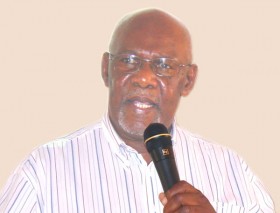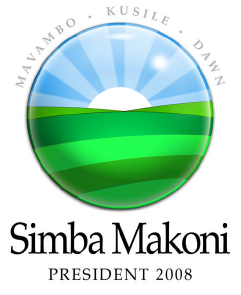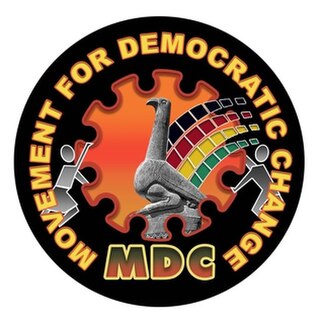Related Research Articles

Roy Leslie Bennett was a Zimbabwean politician and member of the British South Africa Police. He was also a member of the House of Assembly of Zimbabwe for the seat of Chimanimani, where he was affectionately known as Pachedu. He was the Treasurer of the Movement for Democratic Change party led by Morgan Tsvangirai and a member of the Senate of Zimbabwe. He was set to become the Deputy Minister of Agriculture of Zimbabwe until President Robert Mugabe refused to swear him in.

Arthur Guseni Oliver Mutambara is a Zimbabwean politician. He became the president of the Movement for Democratic Change (MDC) in February 2006. He has worked as a director and CEO of Africa Technology and Business Institute since September 2003. Under a September 2008 power-sharing agreement, Mutambara served in the government as one of two Deputy Prime Ministers from 2009 to 2013.

Dumiso Dabengwa was a Zimbabwean politician. He served as the head of Zimbabwe People's Revolutionary Army (ZIPRA) intelligence during the Rhodesian Bush War.

Tendai Laxton Biti is a Zimbabwean politician who served as Finance Minister of Zimbabwe from 2009 to 2013. He is the current Member of Parliament for Harare East Constituency and the second Vice President of Citizens Coalition for Change. He was the Secretary-General of the Movement for Democratic Change and the subsequent Movement for Democratic Change – Tsvangirai (MDC-T) political parties and a Member of Parliament for Harare East until he was expelled from the party and recalled from parliament in mid-2014,before winning the seat again in 2018.
Sydney Tigere Sekeramayi is a Zimbabwean politician who served in the government of Zimbabwe as Minister of Defence between 2013 and 2017. He has been a minister in the Cabinet since independence in 1980, serving as Minister of Defence from 2001 to 2009 and Minister of State Security from 2009 to 2013.
Patrick Antony Chinamasa is a Zimbabwean politician who served in the government of Zimbabwe as the minister of various cabinet ministries. Previously he served as the Minister of Finance and Investment Promotion and the Minister of Justice, Legal and Parliamentary Affairs.
Munyaradzi Paul Mangwana is a Zimbabwean politician, who has previously served in the cabinet of Zimbabwe.
Simbarashe Herbert Stanley Makoni is a Zimbabwean politician and was a candidate for the March 2008 presidential election against incumbent Robert Mugabe. He was Minister of Finance and Economic Development in President Robert Mugabe's cabinet from 2000 to 2002. He faced strong opposition during the Economic Change in Zimbabwe in the early 2000s as his policies contradicted those of the rest of the ZANU-PF party.
Webster Kotiwani Shamu is a Zimbabwean politician and former Minister of Mashonaland West Provincial Affairs fired by President Emmerson Mnangagwa on 21 May 2018. He previously served as Minister of Information and Publicity, and Minister of State for Policy Implementation. He is a member of parliament representing the Chegutu constituency. The Cabinet of Zimbabwe was later dissolved on 27 November 2017.

In January, 2008 the BBC reported that Simba Makoni might be nominated to run against Robert Mugabe in the Zimbabwean 2008 presidential election.
Campaigning for the first round of the presidential election held in Zimbabwe on 29 March 2008 took place from February to March. There were three major candidates: President Robert Mugabe of the ruling Zimbabwe African National Union - Patriotic Front (ZANU-PF), Morgan Tsvangirai of the opposition Movement for Democratic Change, and the independent candidate Simba Makoni.
This article gives details about the vote counting system for the 2008 Zimbabwe presidential election
The events of the first and second rounds of the Zimbabwean presidential election, which Robert Mugabe of ZANU-PF won on 27 June 2008 after his challenger, Morgan Tsvangirai of the Movement for Democratic Change (MDC), withdrew from the process and declared it illegitimate, caused reactions from many international bodies. Other Zimbabwean groups have denounced the poll as well
The second round of voting in the Zimbabwean presidential election of 2008 was held between Robert Mugabe and Morgan Tsvangirai after the first round failed to produce a 50% majority for either candidate. The election process was marred by violence against and intimidation of voters and party workers, which eventually led to the withdrawal of Tsvangirai from the poll. This left Mugabe as the winner of, effectively, a one-candidate election.

The 2008–2009 Zimbabwean political negotiations between the opposition Movement for Democratic Change, its small splinter group, the Movement for Democratic Change – Mutambara, and the ruling Zimbabwe African National Union – Patriotic Front were intended to negotiate an end to the partisan violence and human rights violations in Zimbabwe and create a framework for a power-sharing executive government between the two parties. These negotiations followed the 2008 presidential election, in which Mugabe was controversially re-elected, as well as the 2008 parliamentary election, in which the MDC won a majority in the House of Assembly.

The Movement for Democratic Change – Tsvangirai (MDC–T) is a centre-left political party and was the main opposition party in the House of Assembly of Zimbabwe ahead of the 2018 elections. After the split of the original Movement for Democratic Change in 2005, the MDC–T remained the major opposition faction, while a smaller faction, the Movement for Democratic Change – Ncube, or MDC–N, was led by Welshman Ncube.

Morgan Richard Tsvangirai was a Zimbabwean politician who was Prime Minister of Zimbabwe from 2009 to 2013. He was President of the Movement for Democratic Change, and later the Movement for Democratic Change – Tsvangirai (MDC–T), and a key figure in the opposition to former President Robert Mugabe.

South Africa–Zimbabwe relations have been generally cordial since the end of apartheid in South Africa, although there have been tensions due to political troubles in Zimbabwe in recent years.

General elections were held in Zimbabwe on 31 July 2013. Incumbent President Robert Mugabe was re-elected, whilst his ZANU–PF party won a two-thirds majority in the National Assembly.

General elections were held in Zimbabwe on 29 March 2008 to elect the President and Parliament. Because of Zimbabwe's dire economic situation, the elections were expected to provide incumbent President Robert Mugabe with his toughest electoral challenge to date. Mugabe's opponents were critical of the handling of the electoral process, and the government was accused of planning to rig the election. Human Rights Watch said that the election was likely to be "deeply flawed."
References
- 1 2 "SADC calls Zim crisis meeting" Archived 12 June 2008 at the Wayback Machine , Reuters (News24), 9 April 2008.
- 1 2 "Zambia to hold Zimbabwe summit", Al Jazeera, 9 April 2008.
- 1 2 3 "What Zim crisis?", AFP (IOL), 12 April 2008.
- 1 2 "Zimbabwe opposition rejects run-off" Archived 13 June 2008 at the Wayback Machine , Al Jazeera, 10 April 2008.
- 1 2 3 "MDC says Tsvangirai will not stand in run-off" Archived 15 May 2008 at the Wayback Machine , Associated Press (newzimbabwe.com), 10 April 2008.
- ↑ "Few options for MDC in poll stalemate" Archived 30 June 2008 at the Wayback Machine , newzimbabwe.com, 14 April 2008.
- ↑ Nelson Banya, "Mugabe snubs SADC, political rallies banned", Reuters (IOL), 11 April 2008.
- 1 2 3 "Mugabe pulls out of key meeting on election crisis", CNN, 12 April 2008.
- 1 2 3 "Police ban rallies as MDC calls nationwide job boycotts" Archived 12 April 2008 at the Wayback Machine , AFP (newzimbabwe.com), 11 April 2008.
- 1 2 3 4 "Zimbabwe opposition calls strike", Al Jazeera, 11 April 2008.
- ↑ Bruce Sibanda, "Tsvangirai sets conditions for run-off as strike set to begin" Archived 16 January 2013 at archive.today , Afrik.com, 15 April 2008.
- 1 2 3 4 "Zimbabwe bans political rallies", BBC News, 11 April 2008.
- 1 2 "Zimbabwe focus of regional summit", Al Jazeera, 12 April 2008.
- ↑ "Top MDC official calls Mbeki a 'drunkard'" Archived 20 May 2008 at the Wayback Machine , newzimbabwe.com, 15 April 2008.
- 1 2 3 "Summit delivers no quick fix to Zim deadlock", AFP (IOL), 13 April 2008.
- 1 2 "Zim summit ends at dawn" Archived 13 June 2008 at the Wayback Machine , Associated Press (News24), 13 April 2008.
- 1 2 Serena Chaudhry, "SADC urges rapid Zim poll result" Archived 27 May 2012 at the Wayback Machine , Reuters and AFP (Mail & Guardian Online), 13 April 2008.
- ↑ Full Text — SADC Communiqué [ permanent dead link ] The Zimbabwe Guardian (London)
- ↑ "Zimbabwe poll results release urged" Archived 14 June 2008 at the Wayback Machine , Al Jazeera, 13 April 2008.
- ↑ "Zim court turns down opposition", Sapa-AFP (IOL), 14 April 2008.
- ↑ "Zanu-PF Gears for Run-Off Poll", The Herald (allAfrica.com), 21 May 2008.
- ↑ "Assassination claims stupid, says Zanu-PF", Sapa-Associated Press (IOL), 20 May 2008.
- ↑ Donna Bryson, "US urges Tsvangirai to return", Sapa-Associated Press (IOL), 20 May 2008.
- ↑ "Zim violence: MDC slams Zanu-PF", The Star (IOL), 21 May 2008, page 7.
- ↑ "Zim opposition lawmakers arrested", Sapa-AFP (IOL), 21 May 2008.